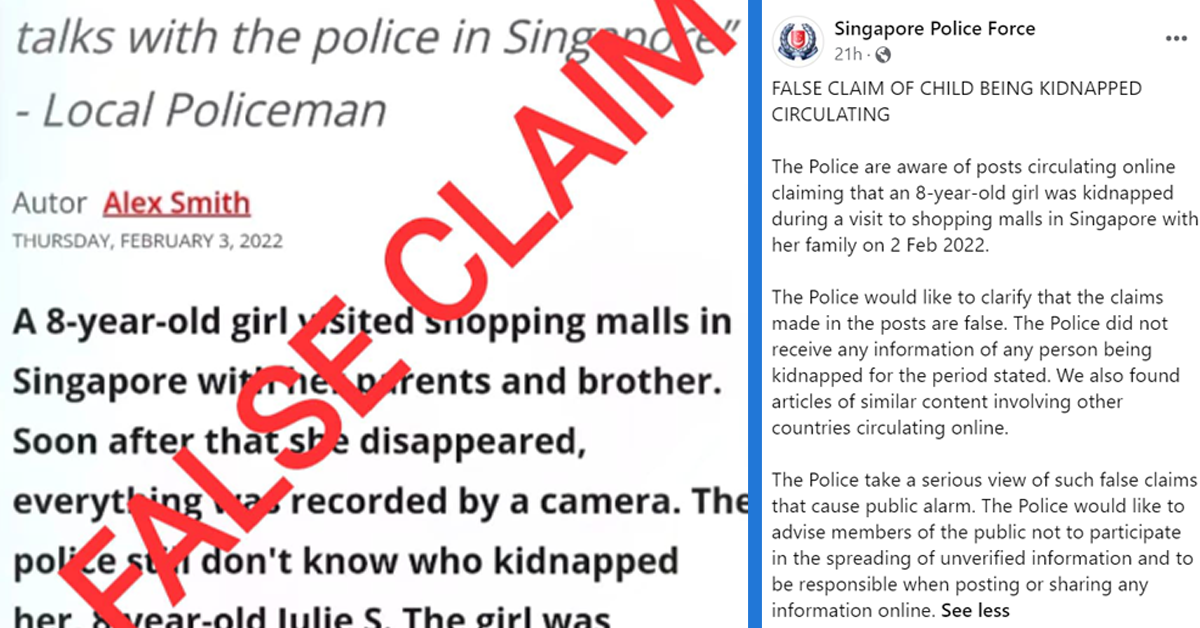Imagine this: One day, you’re scrolling through Facebook diligently looking for Goody Feed posts when you come across this:

There are three possible thoughts that’ll probably come to your mind:
- Oh, since when did we turn into <insert dangerous country that probably starts with M>?
- Hah, another TRS?
- Oh my god, what is the SPF doing?! Why are we paying them so much?!
Well, my suspicious people, if you’ve found yourself losing your cool on behalf of the eight-year-old girl’s parents, I’ve got great news for you.
It’s fake.
SPF: Social Media Post of Child Being Kidnapped in Shopping Malls is Fake
On 4 Feb 2022, the Singapore Police Force (SPF) took to their Facebook page to clarify the recent posts about an 8-year-old child being kidnapped circulating around Facebook.
Here’s the short answer: It’s fake.
And here’s the long one: It’s fakeeeeeeeeeeeeeeeeeeeeeeee.
Editor: Do you want to lose your job?
A joke, it’s a joke. Just like how the Facebook post is, apparently.
But, jokes aside, here’s what the SPF has to say about the posts:
No Information Received, Similar Posts About Other Countries Found
They said that they are aware of the posts circulating online about an 8-year-old girl being kidnapped in Singapore during a visit to shopping malls here on 2 Feb 2022.
However, they’ve not received any information regarding the kidnapping of any person in the period stated.
The claims in the reports are fake, SPF asserts.
In addition, SPF added, they’ve also found similar content involving other countries circulating online.
Members of the public are advised not to spread unverified information, especially those that can cause alarm, and told to be more responsible when sharing or posting any information.
You can read their post in full below:
Why Is Fake News Being Widely Shared?
Now, if you’re wondering, it’s 2022, so why are we still facing fake news? After all, we have more than a decade to get used to how social media works, no?
Well, there’s a legitimate explanation for that.
According to a survey we wrote about last year, that’s because less than 1 in 5 Singaporeans actually verifies the news they read before passing it forward.
The study – the 2021 Edelman Trust Barometer report – measured information hygiene using four parameters:
- Regularity of engaging with the news
- How often they engage with different points of view
- Information verification
- How often they avoid spreading unvetted information
Only 18% of Singaporean respondents were found to practise good information hygiene, while a whopping 46% were rated “poor” for fulfilling one or none of the criteria.
This puts us far below the global average of 27 countries, which is 26% for good information hygiene.
According to the findings of the report, Singaporeans are also slightly more likely to share news items they found interesting.
One reason for such behaviour can be attributed to social prestige, which you and I (definitely me since the Goody Feed office only has cats and you know how cats are all about ego) might be affected by.
You can read more about the survey here.
And even in 2022, it was found that 76% of people here have unknowingly shared fake news.
Read Also:
- Study Shows That Up to 76% of People in S’pore Have Unknowingly Shared Fake News
- Healing the Divide’s Iris Koh & a Doctor Charged for Cheating MOH With Fake Vaccination Records
- Gen-Zers Are Going to TikTok to Offer a Fake Boyfriend / Girlfriend
Feature Image: Facebook (Singapore Police Force)
